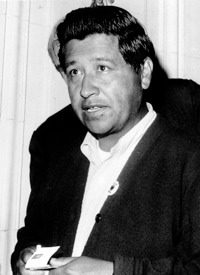
Secretary of the Navy Ray Mabus announced the selection of the USNS César Chávez as the 14th Lewis and Clark-class of dry cargo/ammunition ships. Mabus said, “The decision was an ideal fit for the latest in the Lewis and Clark class of ships, which bear the names of legendary pioneers and explorers. He added,
César Chávez inspired young Americans to do what is right and what is necessary to protect our freedoms and our country. The César Chávez will sail hundreds of thousands of miles and will bring support and assistance to thousands upon thousands of people. His example will live on in this great ship.
A statement from the Navy says the following:
Designated T-AKE 14, César Chávez is being built by General Dynamics NASSCO shipyard in San Diego. Eleven of the T-AKEs are slated to serve as combat logistics force (CLF) ships, and three are slated to be part of the maritime prepositioning force (MPF). César Chávez will serve the CLF missions, helping the Navy maintain a worldwide forward presence by delivering ammunition, food, fuel and other dry cargo to U.S. and allied ships at sea.
"This proud ship will honor one American. But the story of my father’s family is a lot like the story of so many other immigrants, especially Latinos," said Paul F. Chávez, son of the ship’s namesake and president of César Chávez Foundation. "They came to America seeking a better life. In so doing, they brought to their new land a fervent patriotism that has been demonstrated over and over again throughout the storied history of our nation. My dad was like many Latinos and African Americans from his generation who returned home in the years following World War II determined to see that the country for which they sacrificed lived up to its promise as a beacon to the nations of equality and freedom."…
In 1962, Chávez founded the National Farm Workers Association, which grew into the United Farm Workers.
He has been widely honored for turning the spotlight on the plight of farm workers, helping bring them better pay and safer working conditions. Chávez died in 1993. Former President Bill Clinton posthumously presented him with the Medal of Freedom a year later.
Chávez was a Navy veteran and apparently had mixed feelings about the experience.
"In 1944 he joined the Navy at the age of 17," his official biography on the United Farm Workers website says. "He served two years and in addition to discrimination, he experienced strict regimentation."…
Other ships in the Navy’s T-AKE class of dry cargo and ammunition ships are named for innovators like aviation pioneer Amelia Earhart and Antarctic explorer Richard Byrd."
But at least one lawmaker released a statement criticizing the Navy’s decision to add Chávez to the roster. Thankfully, not all members of Congress have succumbed to the Navy’s pandering to radical left-wing elements. "This decision shows the direction the Navy is heading," said Rep. Duncan Hunter, a California Republican who sits on the House Armed Services Committee. "Naming a ship after César Chávez goes right along with other recent decisions by the Navy that appear to be more about making a political statement than upholding the Navy’s history and tradition."
Hunter sent a letter to Mabus, requesting the Navy name its next available vessel after Marine Corps Sgt. Rafael Peralta, who the Congressman said "showed an even greater pioneering spirit when he led a team of Marines into a house in Fallujah, Iraq." Hunter also added that the Navy was making its decision out of a sense of political correctness, rather than any true sense of honoring the military contributions of Hispanic-Americans, such as Sgt. Peralta, who was nominated for the Medal of Honor for action in Iraq. He also suggested that the vessel be named in honor of John William Finn, who as a chief petty officer (and lifelong San Diego resident), received the Medal of Honor for his heroic actions during the attack on Pearl Harbor.
Unfortunately, for Hunter (and for all other patriotic Americans who have respect for the honor and integrity of our military), the ship-naming decision is not up to him. The U.S. Navy Secretary chooses the ship’s name after receiving recommendations from the Naval History and Heritage command and suggestions from service members, veterans, and the public, and generally does not consult with Congress.
Sen. Barbara Boxer (D-Calif.) praised the Navy’s decision, noting that Chávez "worked tirelessly to promote fair working conditions and equal rights for all Americans," along with other prominent liberals, including Max Grossman of the César Chávez Foundation. Grossman, who claims to have known Chávez for over 24 years, says that Chávez wouldn’t have wanted to be given such an honor, because of both his humble demeanor and his opposition to war. In fact, Chávez was not only committed to pacifism and nonviolence, but also described the time he spent in the Navy as “the two worst years of my life,” according to his memoirs, which the Navy rewrites as Chávez “suffering discrimination.”
The Obama administration’s choice to honor this man is unsurprising; Chávez coined the same campaign theme used by Obama: “Si, se puede” (Spanish for “Yes, We Can”). Furthermore, in 2009, Mabus (a member of the Council on Foreign Relations) also was responsible for naming the 13th vessel in the Lewis-and-Clark fleet after civil rights activist Medgar Evers, who like Chávez, was a bitter opponent of American national defense and constitutionalism, as well as a stalwart of the Left. Both activists also contributed little to the general wellbeing of America as a whole, and instead, fought for narrowly defined political causes. Many conservatives feel that this is yet another example of American exceptionalism falling to the wayside, as the forces of identity politics and political correctness rear their ugly heads even in military matters.
Photo: AP Images



